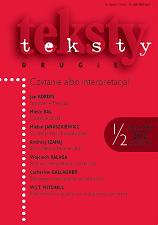

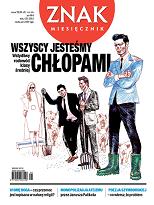
Keywords: Wojciech Czabanowski; Błażej Skrzypulec; Marcin Polak; Pressje
More...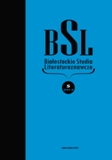
Keywords: Bargielska; death; mourning; loss; the most recent poetry
This article contains reflections on the most important themes of Justyna Bargielska’s lyrics: death, mortality and loss. The peculiar compulsion of creating poems centered around thanatologic motifs stems from the poet’s biographical experience, and her lyrics very often constitute an expression, subversive and iconoclastic, of the female experiencing mourning. Poetry turns out to be a value contrasted with death, but its effect facilitating reconciliation with the inevitability of the end has a fragmentary dimension: conditional and limited in time, which forces us to take further efforts towards the consciously taken job of “creating against death”.
More...
Keywords: political nation; blurring of memory; splitting
This article examines the ways in which national identity took shape among the Polish peasant class. Kolarzowa hypothesizes that this identity is a construct of the dominant class; the peasant class has introjected it rather superficially, and as a consequence Polish identity came to be split in a unique manner. Building on critical theory and postcolonial studies, Kolarzowa focuses on what she sees as the key practices within this process, i.e. the blurring of memory and the mimicry that characterizes identity formation. She also points out the psychosocial consequences of these practices, such as the repressed experience of one’s own social condition (which is remembered but cannot be expressed in the pubic sphere) and the transference of that experience onto a group of Others (Jews)
More...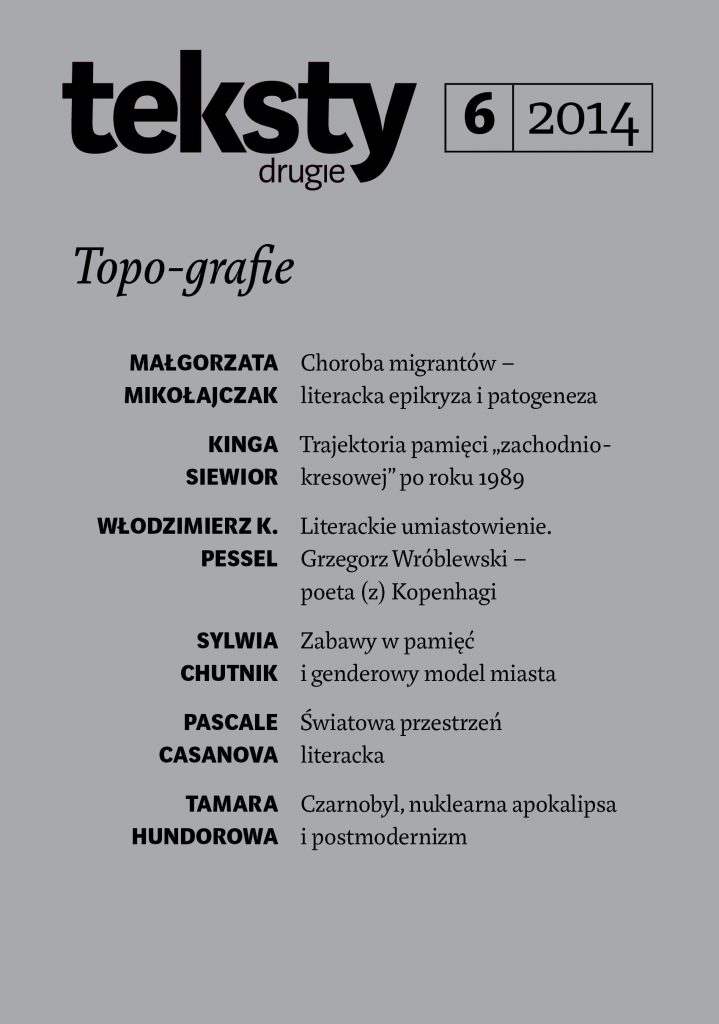
Parfianowicz-Vertun presents a comparative analysis of the US-American travel writings of Miron Białoszewski and Bohumil Hrabal, especially Hrabal’s Listy do Kwiecieńki and Białoszewski’s AAAmeryka. The article contributes to research in geopoetics by examining how the two writers transform their relationships to space into literary material. Some of the key questions are: how do Hrabal and Białoszewski construct urban spaces in their representations of New York? How does their authorial identity relate to space? In what way does the Central European experience confront American realities? And how do they relate to the Polish and Czech émigré communities?
More...
Revising and expanding on his Conjectures on world literature, Morreti suggests in this article that all forms of literature – even those from the core of the literary worldsystem – come from outside and are subjected to local modifications. This means that the model of the world-system, which assumes transmission from the core to the periphery, does not explain the history of forms. Since all forms of literature result from foreign influence, these influences should also be diagnosed across literary structures. Moretti’s modified vision of the mobility of forms requires a broadening of research and acknowledging that comparative literature is related to ideas about how the world works.
More...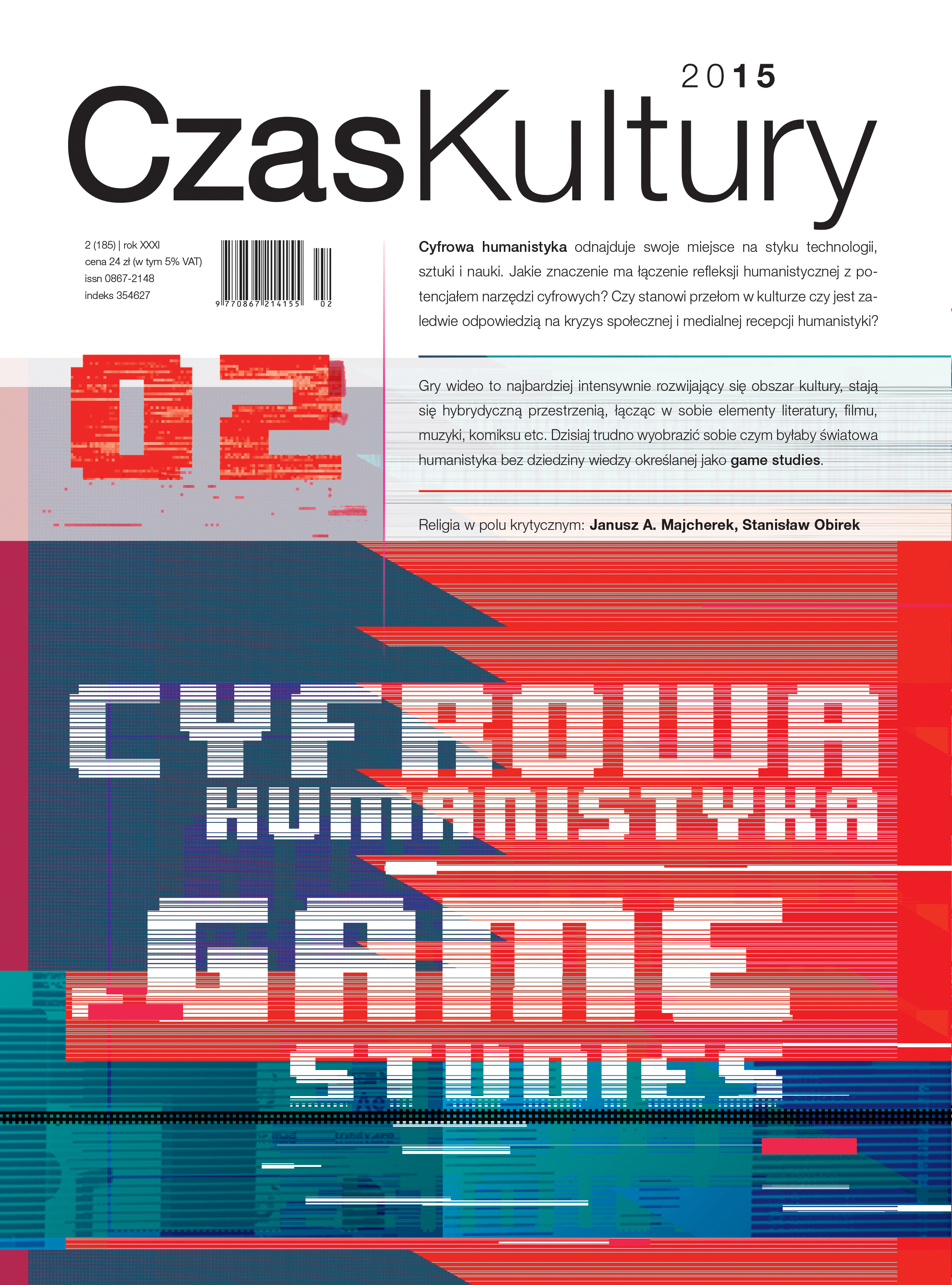
Keywords: humanities;laboratory;literature
This article aims to describe how the humanities is “moving” to laboratories both metaphorically (the lab as a paradigm) and literally (produced by humanities labs). The combination of the humanities and the laboratory – theory and practice – is present in the digital humanities in particular. Discussion of the issue is focused on the Electronic Literature Lab at Washington State University in Vancouver, run by prof. Dene Grigar (Head of the Electronic Literature Organization). The Electronic Literature Lab shows how the digital humanities combines programming with creative writing (creating kinetic literary projects) and media archaeology with the history of electronic literature (the protection of and access to songs from the 1980s and 1990s).
More...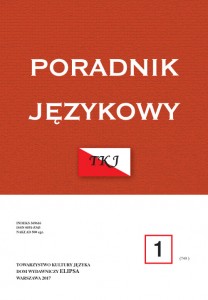
The aim of this paper is to analyse Henryk Sienkiewicz’s reports on painting exhibitions from the genological viewpoint. The reports were published in „Gazeta Polska” (“The Polish Gazette”) in the period 1879–1881, in „Kronika miejscowa” (“Local Chronicle”) column. The texts are an interesting object of research due to their not fully determined genological status: for some researchers these are feuilletons, for others – critical reports, that is reviews in fact. Material analyses permit the location of Henryk Sienkiewicz’s accounts on painting exhibitions within the genre fi eld of reviews, with complex correlations between review and feuilleton and between review and report taken into consideration. As was rightly noticed by Bożena Witosz “genres crystallise their features together with other forms of expression which function in a given culture at a particular time” (2005: 181). Reports are a realisation of the alternate review pattern. Modifications resulting in the creation of a variant refer to: limiting the subject matter to evaluation of paintings (the cognitive aspect), combining information with evaluation and opinion (the structural aspect), expanding the illocutionary potential (the reports fulfilled various functions: information, education, popularisation, persuasion). As regards stylistic features, multi-style, resulting from the abundance of style registers, is typical of reports.
More...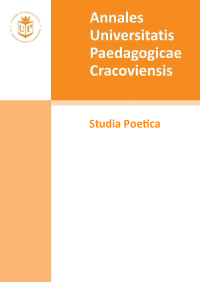
Keywords: Polish prose after 1989;breakthrough;canon;tradition
The article discusses the existence and functioning of the notion of canon in the social consciousness after 1989 in the context of Polish prose of the last twenty years. It points to two semantic circles connected with this notion: the first circle refers to literature and culture of the nation deeply rooted in tradition and confined in the past. The second circle is of polysemous character and refers to the contemporary literature and culture. The deliberations concentrate on the second semantic circle as the notion of national literature, the necessity of its existence in the nation and passing it to the next generations are undisputable. In the Polish culture after 1989, the notion of canons appears more often than the notion of a canon. The notion refers to phenomena that frequently exist on the border of literature, culture, and social life. For those phenomena, it builds canonical sets of texts defined and perceived as important and constitutive for their authors, and obligatory for their recipients. It becomes the vehicle for new literary qualities at the level of formal, thematic and problematic transformations. It is also a phenomenon that functions in the space of a particular culture and tradition with which it evolves.
More...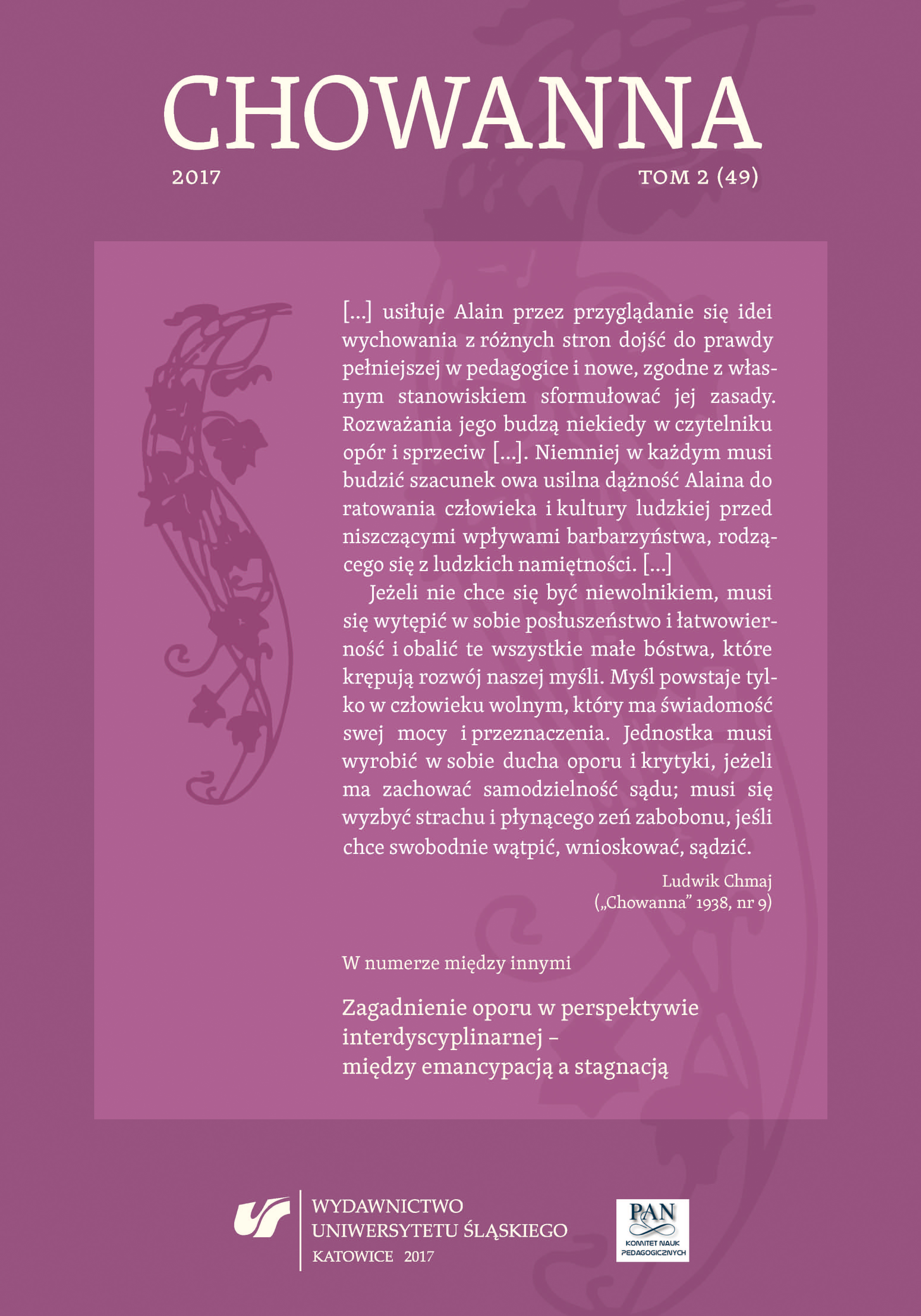
Keywords: nature–culture relation; Polish Studies didactics; anthropology of reading; literary culture
This text’s aim is to draw implications for school didactics that result from the human being’s entanglement in the orders of both, nature and culture. In her considerations, the author attempts at a re-enactment of the manner in which complementary arrangements of nature and culture find their common ground in educational thought, and their objective expression in the sphere of Polish teachers’ education. Yet, the said considerations do not involve all facets of the school subject in question, neither do they relate to any particular stage of education. What is elucidated herein, are merely selected questions of literary culture, namely, the essence of contemporary reading practice being a premise upon which one may raise a cultural anthropology concept of the literary-cultural education that echoes the views by Polish Studies’ theoreticians and practitioners.
More...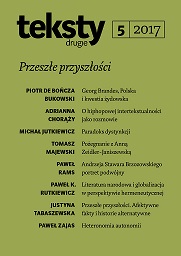
Keywords: Georg Brandes; the Jewish question; nineteenth- and twentieth-century culture and politics; comparative studies;
The Danish literary critic Georg Brandes (1842-1927) played an important role in late nineteenth-century Polish culture. By giving public lectures in Warsaw, Cracow and Lviv, he championed the cause of Polish independence and inspired Polish positivists. Brandes’s closeness with the Poles was shaken when he instigated a debate on the Jewish question and Polish anti-Semitism, so that his relationship with Poland gradually transformed into distance and hostility. This article examines the background, genesis and development of the conflict while also outlining research perspectives on this difficult and politically sensitive topic. De Bończa Bukowski analyses those of Brandes’s most relevant views on the Polish and Jewish question – views that took shape in relation to contemporary discourses on liberal nationalism, assimilation as well as Zionism.
More...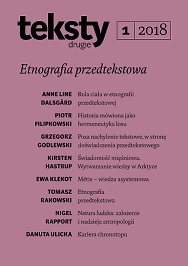
Keywords: anthropology; fieldwork; skill; body; perception; abduction; hunting;
Hastrup discusses the process of knowledge-making in anthropology, as based on fieldwork, yet not reducible to this. She organizes her argument in terms of skills, a concept that is owed to Ingold (2000) who stresses that skills are not simply techniques of the body, but capabilities of action and perception, growing through an active engagement with the constituents of the surroundings. The skills identified here, and by which the hunters relate to their world, are the skills of wayfaring, of forecasting and of timing – skills that the fieldworker identifies when going along with the hunters. In the concluding section, Hastrup addresses the skill of abduction, which she see as the core of knowledge making, among hunters as well as anthropologists.
More...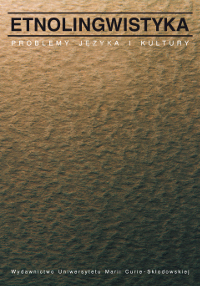
Keywords: linguistic-cultural worldview; colloquial variety of language; balanced data base; linguistic-systemic data; linguistic-textual data; data from questionnaires; open questionnaire; experimental method;
The author relates to the words of Wojciech Chlebda and Anna Horolets concerning Europe (at a meeting of the Ethnolinguistic Committee of the Polish Academy of Sciences, December 4, 2009, published in the present volume in a slightly modified form) and continues to advocate his methodological postulate that the reconstruction of the linguistic worldview (JOS) within the EUROJOS research programme focus on what is common, entrenched in the colloquial (standard) variety of a given language, rather than limiting oneself to just one category of data (collocations, proverbs) or a single type of discourse (e.g. political). On the methodological platform, the postulate amounts to making use of various sources of data and techniques of their analysis. A reconstruction of the linguistic worldview should be based on a “balanced” foundation, embracing systemic-linguistic data, textual data (corpora) and questionnaires. The author shows that in the case of EUROPE, the last, experimental method (open-ended questionnaires) enables one to enrich and verify poor lexicographic data as well as diversified textual data.
More...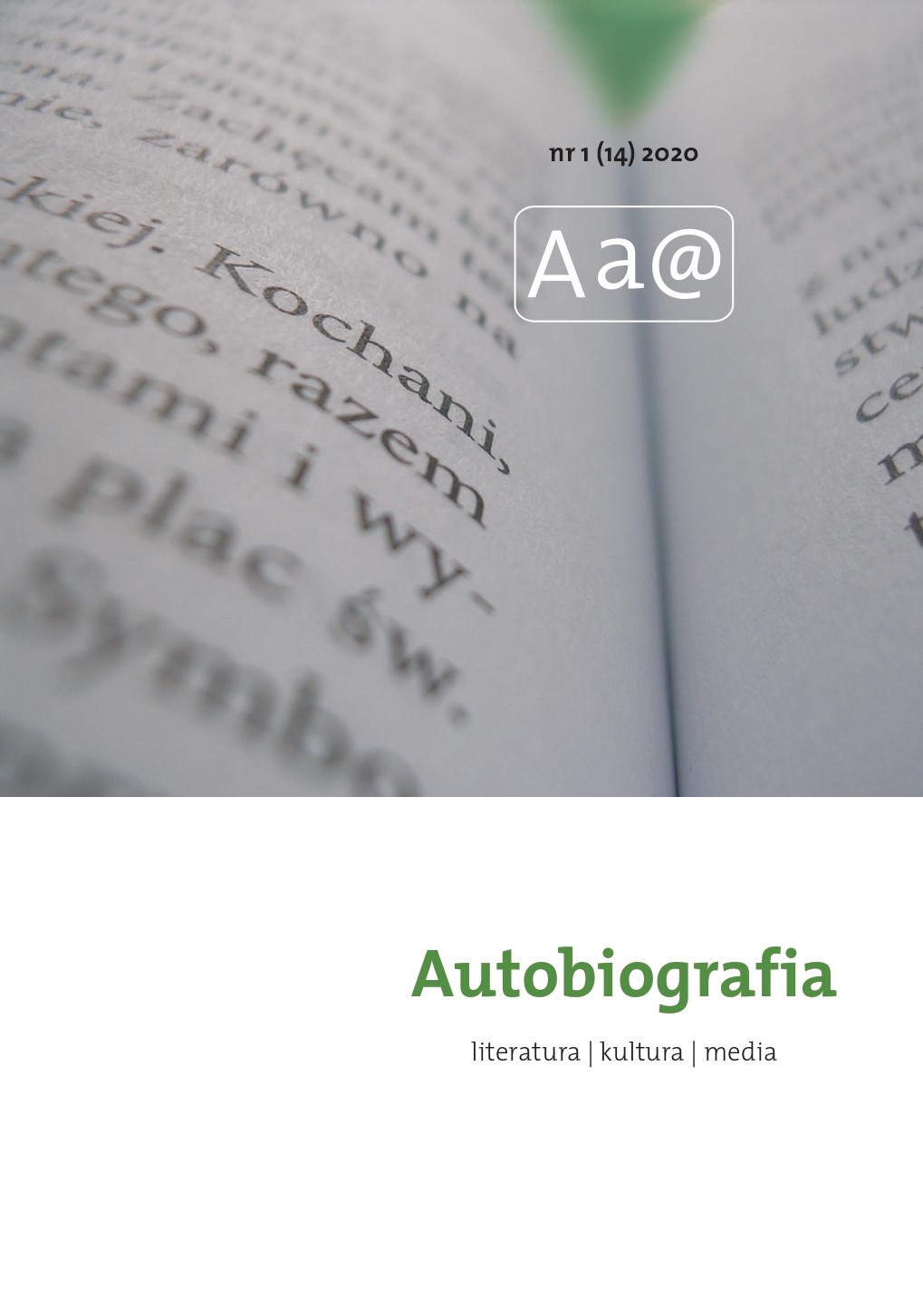
Keywords: autobiography; diary; marginalia; survivors; Holocaust; life-writing; methodology;documents;
This text introduces a collection of articles which seek to interpret Jewish ego documents and testimonies, broadly defined. Reading these documents facilitates a process of uncovering intimate threads and problematizing Jewish biographies.
More...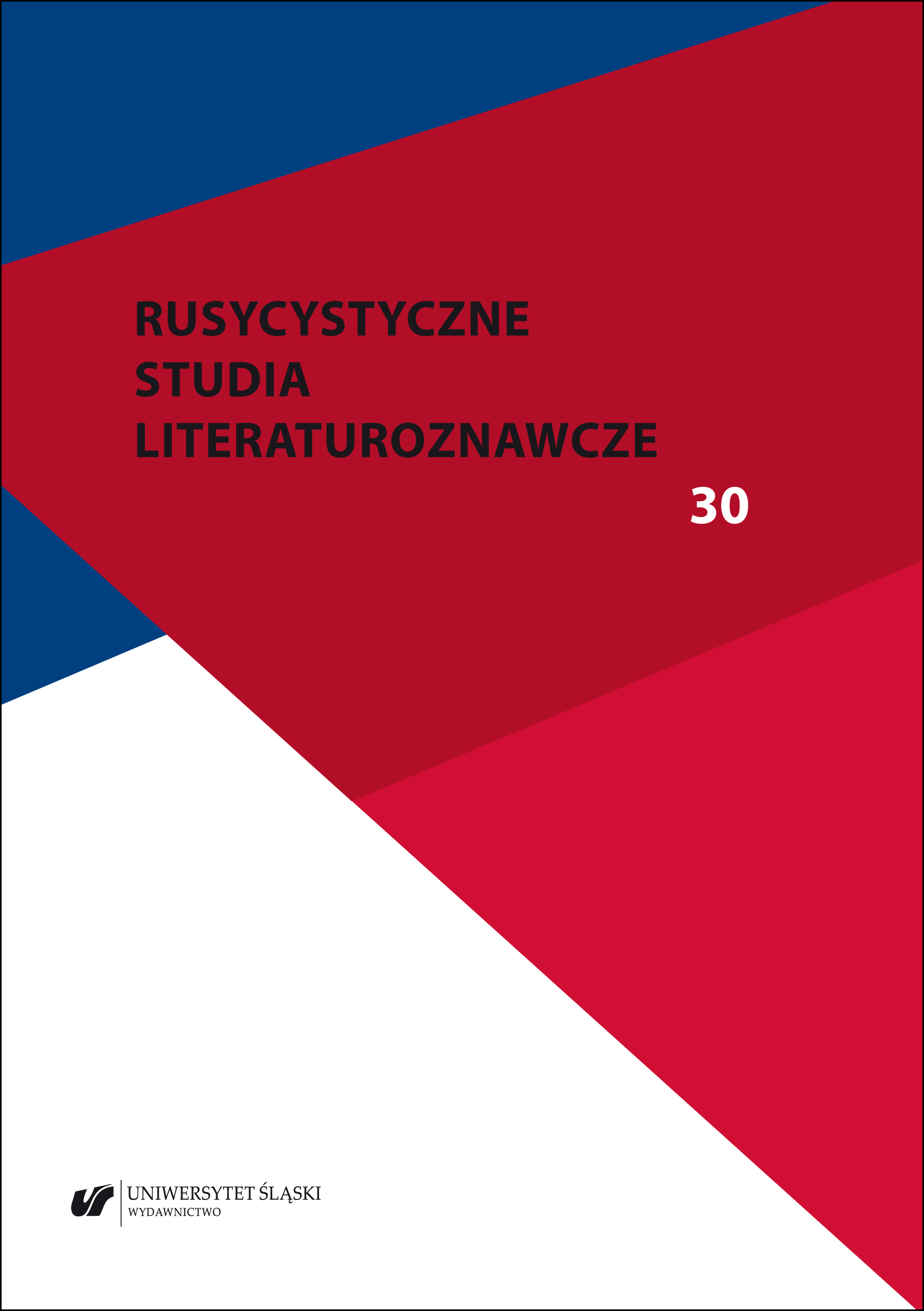
Keywords: Limonow; Nazbol generation; National-Bolsheviks; testimonial literature;non-fiction;
In this article, the author shows that Eduard Limonov’s social and political activity was directed not only at achieving short-term political goals, but also at educating a new generation of Russians. As he head of the National-Bolshevik Party, he was a “godfather” to young people disappointed by the Russian reality of the 1990s and the early years of the presidency of Vladimir Putin. The testimonies in the collections entitled “Лимонка” в тюрьму and “Лимонка” в войну demonstrate that Limonov ultimately achieved his goal of shaping a generation of ideologists ready to sacrifice for their homeland.
More...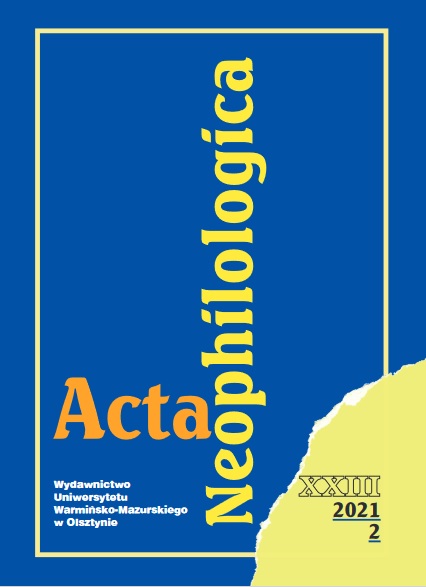
Keywords: Lotman; semiotics; reception of a literary work; contemporary theories of reading; Eco
This article presents Yuri Lotman’s reflections on a reception of a literary work in the context of contemporary theories of reading. The first part of the article presents Lotman’s position in an evolutionary perspective from Lectures on structural poetics (1964) to Culture and explosion (1992). The second part places Lotman’s position in numerous contemporary conceptions of reception and points to the close resemblance to Umberto Eco’s ideas, which were developed in his book Lector in fabula.
More...Keywords: energy humanities; oil; humanities; literature; visual media
The article mentions a trend developing in the Anglo-Saxon academia for nearly a decade,namely energy humanities, which constitutes the text’s methodological foundation.Referring to diagnoses of this trend, Lubińska analyzes the reasons for the absence ofthe theme of oil in current Western culture, especially literature. To that end, the articleargues that – among other energy sources – oil remains particularly invisible in culture.These observations are confirmed through references to numerous literary texts thatdeal with coal. Lubińska answers why representations of oil are primarily the domain ofvisual art rather than literature.
More...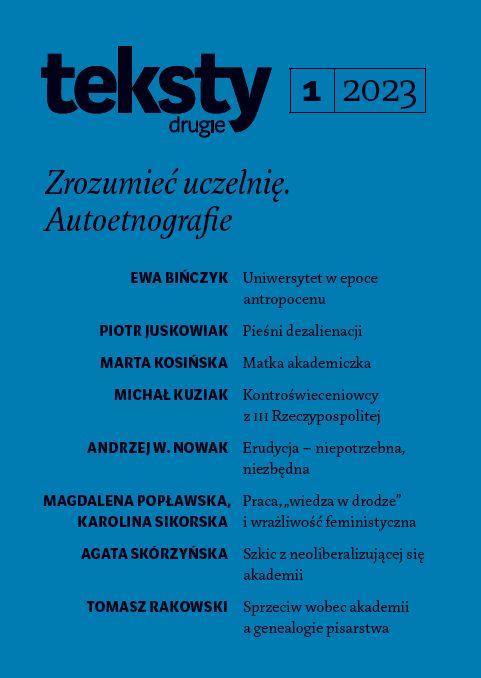
Keywords: self-reflexive sociological analysis; self-reflexive objectivization; problem-oriented autoethnography; critical university studies; academy neoliberalization; university restructuring;
This text stems from an autoethnographic process implemented within the frameworkof the NCN Opus 19 research project “Social Circulation of Knowledge in the Humanities.”Inspired by Pierre Bourdieu’s method of self-reflexive sociological analysis orobjectivization – along with critical university studies reflection – the author treatsthe autoethnographic process as a complement to analyses of global, structural, andsystemic transformations, assuming that its effect is not so much the reconstruction ofan autobiographical perspective but rather an investigation of the relationship betweenthe subjective and institutional dimensions of academic practice. In this case, theobject of study is the process of the institutional “disappearance” of the academiafrom the experience of its actors – researchers – which is linked to the mechanismsof the academy’s neoliberalization and the phenomenon of “knowledge corruption”(C. Crouch). Autoethnographic notes provide illustrations of the university’s institutionalrestructuring process that occurred following J. Gowin’s reform. Moreover, they provideinsight into the experience of participating in the description of the “third criterion”evaluation.
More...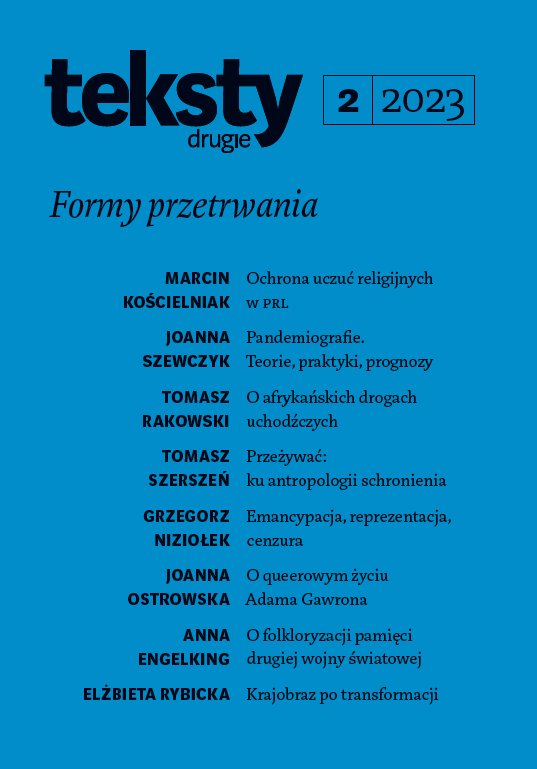
The collective memory narrative of wartime and the Holocaust – recorded in theBelarusian and Ukrainian parts of the Polesie region – presents from an emic perspective alesser-known representation of the Second World War: a vernacular, autonomous variant,independent from the (post-)Soviet discourse of (non-)remembrance. Methodologically,this contribution aims to foster discussion on the intersections between folklore studies,oral history, and memory studies. A distinctive feature of this narrative is its parallelism:accounts of mass murders of Jews and peasants share a common structure andconceptual-axiological framework. An analysis of similarities and differences betweenthe narrative variants, conducted using Vladimir Propp’s method, reveals the affiliationof Jews and peasants within a shared category of innocent people, contrasted with “nonhumans:”Germans and their accomplices from “their own” group.
More...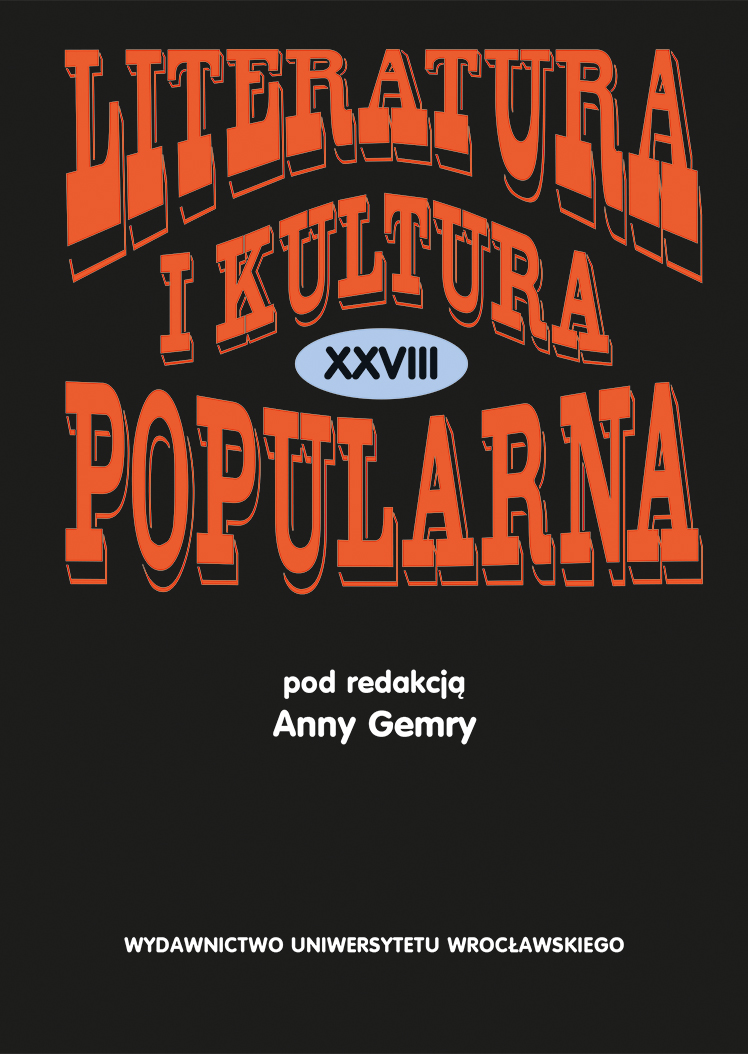
Keywords: history ofliterature; the Internet; digital literature; Polish literature; literary field
This article discusses the main theses formulated in Poszerzanie pola literackiego. Studia o literackości w internecie written by Elżbieta Winiecka. The author of this monograph has noteworthily analysed relations between literature and the digital world. Important research context here is the notion of literariness and the concept of literary field. The scholar also combines theoretical reflection on the boundaries of literature and the consequences of technological development with critical interpretations of specific texts or projects. The great value of this book is the fact that the author places the reflection regarding digital e-literature in the context of Polish literature and culture. Furthermore, Winiecka emphasises the links between art and contemporary social and political problems. Thus, the researcher takes part in the debate on socially engaged art and the functioning of literary texts in the social space.
More...